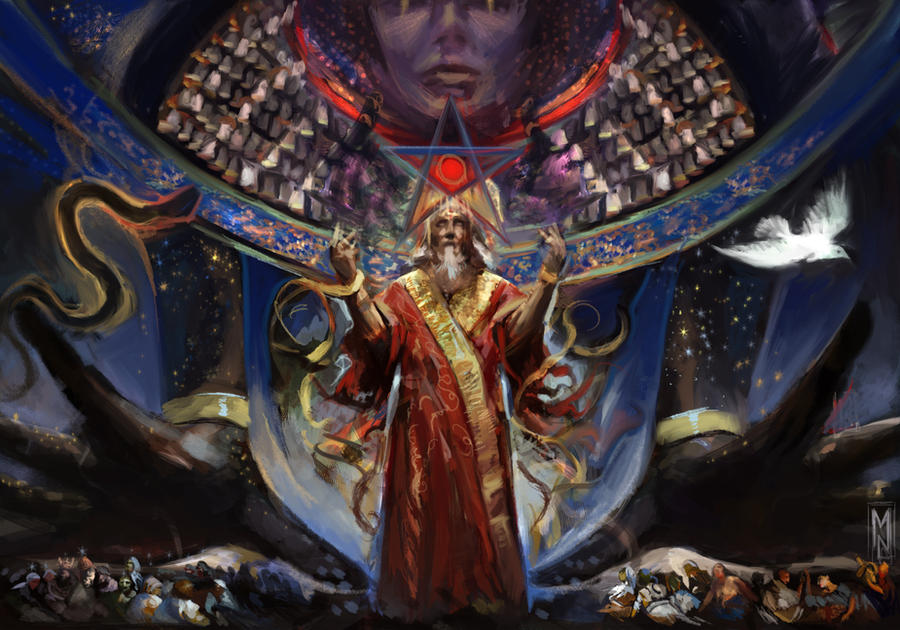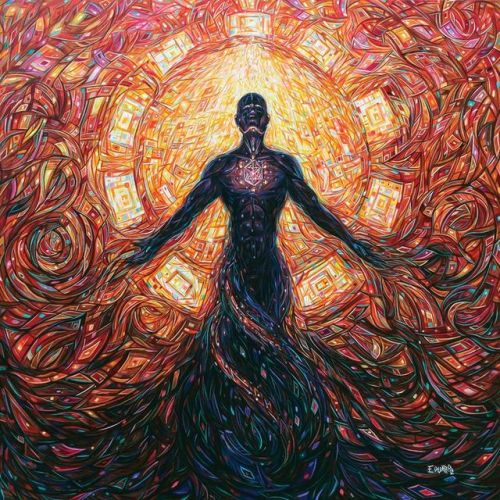Now we’re going to talk about Invocation. This is one of the big practices in western magick, and so unsurprisingly, hardly anyone on the occult scene does it.
Put in simple terms, invocation is where you perform a full-blown ritual to summon and draw into yourself the energy of a divine being, an archetype, a god (not always called “gods” though, you could invoke an “archangel” or a “planetary intelligence” but they are ultimately all the same: gods of a sort). You connect to this divine being, and draw in its presence or its energy in such a way that it allows you to create change in accordance with your Will.
Unsurprisingly, only a few magicians have actually performed an invocation. Quite a few people have been to wiccan rituals where they “called down the goddess” or that sort of thing, which when performed right is a minor sort of invocation; though these days its hardly ever performed “right” (and by “right” I don’t mean according to some kind of religious custom, but simply in the sense that it would actually WORK as an invocation). A lot of the more cheapass new-age occult books mistake invocation for “affirmations”, in the style of that character from the old Saturday Night Live sketch who would look himself in the mirror and say that he was special; only here instead you look at yourself in the mirror and say “i call upon the archangel sandalphon to give me his white light and protect me from my mother in law getting all in my business”. Unsurprisingly, this is a useless placebo.
Actual invocation involves the performance of ritual magick, and the use of correspondences; most often through the Kabbalistic Tree of Life. Since any symbol can be placed somewhere on the tree, you can look up the symbols associated with a particular god; those images, colours, etc. that are all all at the same place on the tree of life. You decorate your ritual space with these correspondences, these colours, gems, animals, plants, images, signs, numbers, etc. Imagine the potential in an modern occult game: the PCs are police inspectors who come upon an occultist who’s been brutally murdered; in his room is a magic circle (drawn in paint, chalk, or even blood) with strange names around it (possibly in Greek or Hebrew letters). In the center of the circle an altar, with an incense burner, a dagger (unless that’s what’s in the corpse of the would-be magician now), a wand, a cup, and a plate with some sort of weird design on it, a lamp, an incense burner, and a copy of Aleister Crowley’s Book of the Law.
But there’s also a dark purple tablecloth, and purple items surround the room for some reason. There’s a large statuette of Artemis of the Ephesians, a bizarre goddess covered with tits; but also a smaller statuette of Ganesh, what seems like a cupid, some Egyptian goddess doing what looks like a yoga pose (Nu), and the voodoo image of Ellegua.
There’s also a small toy statuette of an elephant, a frog with a coin in its mouth, and a clay turtle.
There’s jasmine and sandalwood incense, half-burnt; and also a tea-like concoction that analysis will reveal to have been made with laurel leaves and damiana (an aphrodisiac). There are quartz and beryl and moonstone crystals scattered around, and lead weights.
There’s also the four number-9 tarot cards out on the corners of the altar, but just them, and a slip of paper with the sign of cancer.
That’s what an invocation of the Lunar goddess would look like if it were interrupted. Pcs probably would only be able to make sense of it all looking at the magician’s diary, if they could find it. There may or may not also be some clues as to what he was trying to accomplish with the invocation: you could invoke the moon for visions, for developing the instincts, for exploring the subconscious, for restfulness, for working with dreams, or for something related to the sea, among other possibilities.
What does an invocation actually feel like, and do? To an outsider, it might not look like it does much of anything. The magician does a circle-ritual (banishing, then invoking) and then makes a “Call” where he summons down the higher power in question, then it enters him, and then he closes the operation. To the participant, at the time you’re doing it, the feeling can vary from just a mild sense of altered perceptions to a total blowing-away of your own being for a few moments as you very briefly BECOME the god you are invoking. But usually, at the moment of invocation itself you don’t get any really big effects; its after, that things get interesting.
What doesn’t happen (or at least really shouldn’t happen) is some kind of voodoo-style possession. The person never loses control of their faculties when they do an invocation; they just turn on a tap of a very particular kind of personality trait or energy, that then alters their perceptions, and even their mental and physical potential compared to before! An invocation ceremony is one part mind-altering drug, one part steroid or pep pill or smart pill, and one part intentional voluntary self-brainwashing.
One thing to keep in mind is that invocation primarily changes yourself. Don’t take that to mean, however, that weird things don’t start to happen all around the person when that person gets “changed” by taking a million-volt dose of god-energy into them; there can be a lot of peripheral weirdness that manifests! People reacting differently to the magician, the universe seeming to realign in reaction to the “radiation” of the magician (so that someone invoking Venus will end up suddenly finding suitors coming running to them, or someone invoking mars might suddenly become a magnet for aggression without necessarily being the direct cause of it, etc), and other weird events can be common. However, the actual WORK of the invocation is taking place internally, in the magician’s being.
So when someone invokes, the way to make change in the outside world ends up being to channel that energy into the outside world. So someone might invoke Jupiter for constructive work, they would feel inspired and full of ideas and shrewd insights that they would then have to apply to actually get a project done. All invocation does is give you potential; whether you think of it in an “energy model” (as that you’re tapping into certain universal energies) a “psychological model” (you’re tapping into parts of the collective unconscious and thus expanding your awareness), or something else (like the literal notion of gods, or the information model that sees reality as a kind of machine), the key is that you can do pretty awesome things through invocation, but only if you FOLLOW THROUGH. Someone who invokes and then sits on their ass will accomplish nothing; what’s more, there’s every chance the energy will “go sour” with nothing to do and create some serious backlash and problems for and around the half-assed magician.
There are potential pitfalls to invocation too; basically, every time you invoke you’re trying to change yourself. You’re seeking to adjust your own personality and being (and if you aren’t, then your invocation won’t work!). So sometimes, invocation can lead to radical changes in a person’s personality, which if not carefully managed can be shocking to others or even to one’s self. What’s more, there’s always a danger with invocation of “invoking to your strengths”; people will invoke those archetypes, energies or gods they already feel sympathy for, in order to obtain more traits of what they already have (the brainy guy wanting to invoke mercury for more intellect, for example). This can lead to seriously unbalanced personalities. On the flip-side, invoking against type can often lead to much bigger changes of personality which often bring very unpredictable and sometimes disastrous results in one’s life.
Also, in the higher sense, invocation is meant to be used for that process of opening up the consciousness, for divine union and understanding the universe and the nature of reality; when it is done right, you literally become an aspect, an archetype, a facet of God for a little while; that it can also be used to open up one’s potential and obtain certain material results in the material world is perfectly fine, as long as that doesn’t become the real goal or only purpose, and invocation work is brought down into the level of the mundane, and then the banal. When that happens, when magicians start invoking mercury to help them get through the supermarket checkout line faster, you inevitably end up with a serious burnout case.
Depending on how much potency you want to give invocation, it would be easy to see how this system of magic would be translatable into some very interesting RPG play.
RPGPundit
(Originally published October 24, 2012)





No comments:
Post a Comment